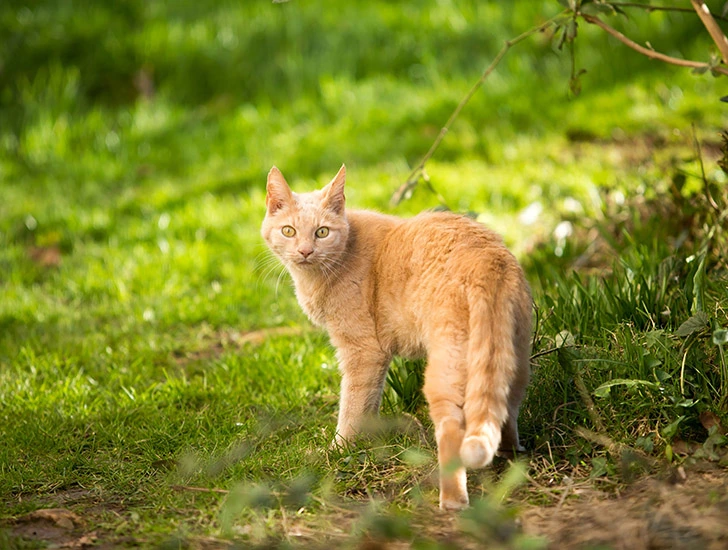From dangerous plants to household cleaners, many everyday items can lead to poisoning. Learn more about how to keep your cat safe from toxic substances, how to spot signs of poisoning in cats and what to do next.
While poisoning in cats is no more common than poisoning in other pets, cats are sometimes less likely to recover from poisoning than a dog might be. This is due to:

There are many different poisons, and many different reactions to poisoning. Signs that might show that your cat has been poisoned include:
Signs of poisoning tend to appear suddenly, so it is important to be aware. Even if you only suspect that your cat has swallowed or touched something poisonous, you must act quickly. Contact your vet immediately. Don't wait for signs of illness as by then your cat may be too sick to survive.
If you can see the poison, take your cat away from it immediately. If possible, take a sample of the poison with you to your vet appointment to help the vet choose a course of treatment.
Your vet may ask you to bring your cat in immediately, or may give advice over the phone. Forcing or encouraging your cat to vomit may not be helpful and you should not try to treat your cat’s symptoms yourself.
Recovery from poisoning in cats depends on timing. The sooner your cat has medical attention, the sooner treatment can begin and the less time the poison has to make its way through your cat’s system.
For many cats, those who receive early treatment will return to their normal selves within a short time. Speak to your vet for more information on your cat’s rate of recovery.

You might be surprised to find that many household items, or at least those kept in your garden, shed or garage, are poisonous to cats. Cleaning products, decorating chemicals (for example, white spirit) and pest control agents can all be harmful if ingested. These include:
slug bait – especially if it contains metaldehyde or methiocarb
rodent bait – especially anticoagulant types. Be aware that cats can also be harmed by eating poisoned rodents
weed killers
insect killers
Antifreeze is used often in the winter in car radiators or in screen wash and de-icers to prevent freezing. Containing ethylene glycol, this substance is particularly harmful to cats and can prove fatal if ingested. It only takes a spillage on the driveway or a cat walking through a puddle and then grooming its fur for the poison to be ingested. This quickly affects a cat’s kidneys, with damage sometimes so severe that the cat may not survive.
To prevent your cat from the poison in antifreeze, try to use screen wash or de-icer sprays that do not contain ethylene glycol. If you have drained your car radiator and some of the product remains, wipe it up quickly. Keep products containing ethylene glycol out of reach, so your cat can’t get to it.
If you suspect that your cat has been poisoned by antifreeze, take them to the vet immediately.
Over the counter medication like paracetamol and ibuprofen might be effective for humans, but they should never be given to cats. Cats are very sensitive to these medications, and as little as one tablet could be fatal, causing severe liver damage.
Signs of poisoning in cats that have ingested painkillers include difficulty breathing, pale blue gums and swelling of the paws and face. Later there may also be vomiting and they may pass dark urine. If you suspect this has happened to your cat, take them to your vet straight away.
While lilies might look pretty, they can sadly be deadly for felines, and are the most commonly reported poisoning in cats. Several types of lilies have found to be poisonous to cats, including:
All parts of the lily plant are toxic and consuming even small amounts can cause poisoning in cats. Kittens are particularly prone to poisoning as they explore the environment around them, while older cats may brush against the flower’s pollen and then absent-mindedly lick it off their fur.
The toxicity of lilies affects a cat’s kidneys, causing a harmful reaction. Within minutes of ingesting any part of the plant, they might become lethargic or begin to vomit. As the substance begins to affect their body, these signs worsen.
If you suspect lilies have poisoned your cat, speak to your vet immediately – emergency care increases the likelihood of your pet making a full recovery.

Whilst it is important to treat your cat regularly for parasites such as fleas and ticks, under the guidance of your vet, to help keep your feline friend safe, always follow the directions carefully. If you are concerned that you haven’t applied it correctly, get in touch with your vet.
It is essential never to use flea or tick treatments intended for dogs, this is because some of these products contain Permethrin, which is very poisonous to cats, but well tolerated by dogs.
If you have a cat that is happy to eat everything they’re given, it might surprise you to learn that some foods are poisonous to cats.
With cats content to investigate shopping bags and leftovers in the kitchen, food is often readily available in the home – and this can unfortunately make your cat unwell. Some of the most common foods to cause poisoning in cats include:

Most essential oils are toxic to cats, particularly if they are neat (undiluted.) This includes the following:
Worried that your salt lamp might make your cat unwell? While some cats choose to avoid items in the home that are considered toxic, there is always the possibility that curious cats may lick a salt lamp without knowing the dangers.
A little salt, such as that found in cat food, is neccesary for your cat's body to function properly. However, too much salt can be fatal to your cat. This is due to an overdose of sodium.
Signs of salt poisoning include the following:
For this reason it's best to avoid having Himalayan Salt Lamps in your home, or place them well out of your cat's reach. If you think your cat has been poisoned by salt, seek the advice of your vet immediately.
